
Julius Caesar was also known as Gaius Julius Caesar, he born on 12 July 100 BC in Rome Italia, and death on 15 march 44 BC at an age of 55. Julius Caesar was a great Roman dictator, politician, and military general of the last Roman Republic, who played a very critical role in an event of the crisis of the Roman Republic and the rise of the Roman Empire. He was a leader of ancient Rome.
Where the name Caesar originated has been debated. It might have been related to the procedure of the cesarean section, it could have been linked to the saying of an elephant or it might have been down to the first Caesar’s thick, curly locks of hair.
He fought in several wars and become involved in Roman politics. After several treaties and military victories, he became dictator of the Roman Empire, a rule that lasted for just one year before his death.
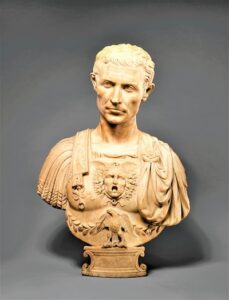
Quick Facts of Julius Caesar
- Born: 12 July 100 BC in Rome, Italy, Roman Republic
- Also Known As: Gaius Julius Caesar
- Political party: Populares
- Spouse(s): Cossutia (disputed), Cornelia (84–69 BC; her death), Pompeia (67–61 BC; divorced), Calpurnia (59–44 BC; his death)
- Children: Julia, Caesarion (unacknowledged), Augustus (adoptive)
- Parent(s): Gaius Julius Caesar and Aurelia
- Died: 15 March 44 BC (aged 55) Rome, Italy
- Cause of death: Assassination (stab wounds)
- Burial: Resting place Temple of Caesar, Rome
- Awards: Civic Crown
- Quotes: I love treason but hate a traitor. – Julius Caesar
Early Life Of Julius Caesar
Julius Caesar’s father name also Gaius Julius Caesar and his mother’s name is Aurelia Cotta. Julius Caesar has come from a patrician family, which claimed he was a descent from Julia, son of the legendary Trojan prince Aeneas, supposedly the son of the goddess Venus. Julius Caesar’s birth marked the starting of a new era in Roman History.
When Julius Caesar was 16 years old suddenly his father died in 85 BC and he becomes head of his family, This was a time of division in Rome and there was a bloody civil war. between his uncle Marius and his rival Lucius Cornelius Sulla. In 84 BC Julius Caesar Married Cornelia the daughter of an ally of Marius and Lucius Cornelius Cinna. Caesar and Cornelia together have one daughter named Julia.
After Sulla’s final victory in the civil war ordered He was stripped of his heritage, his wife’s dower, and his priesthood, but he refused to divorce Cornelia and Caesar left Rome and join the military. But Julius Caesar had a stroke of luck when his mother’s family joined the support of Sulla.
He was allowed to come out of hiding, but he was stripped of his title of priest. As things went, this would make the man be, because priests were not allowed to become part of the military. Free of his title, caesar looks to the army. He serving under Marcus Minucius Thermus in Asia and Servilius Isauricus in Cilicia.
He soon becomes a man of distinction and received Civic Crown for his part in military victories. When Julius Caesar was 22 years old the great sulla died, and with him out of the way, Caesar knew he could likely return to Rome without fear of being killed by an enemy.
That he did and he acquired a house in the “Subura”, a lower-class neighborhood ripe with a crime where the streets always thronged with people. Stripped of his inheritance, Julius Caesar was not a wealthy man by any means. He’s getting to know those streets would shape his view of life. He would not forget the average man.
Julius Caesar Brought down a corrupt governor who had taken advantage of their position. He was renowned for his gift of speech and dazzled people with his fluid orations. He fought righteously and won. He garnered even more praise in Rome after people heard the story of him being kidnapped by pirates when he was sailing to Greece.
How Julius Caesar Political Career Start
Julius Caesar began his political career as a prosecuting advocate, After sulla’s death. In 69 BC He became a military tribune and the treasurer of a Roman province. The same year his wife Cornelia died, he lost his wife then Julius Caesar married again to Pompeia, the granddaughter of Sulla.
At the age of 37, he ran for the position of pontifex Maximus, which translates as chief priest of the Roman state religion. It was a messy affair, with his rivals for that post accused of corruption. But Caesar won and it wasn’t even close. In 62 BC Julius Caesar divorced Pompeia
At the age of 41, he was elected senior Roman consul, a position he gained with the help of some powerful friend. He and these two friends would form what is called the first triumvirate. This consisted of Julius Caesar, Gnaeus Pompeius Magnus (Pompey), and Marcus Licinius Crassus.
Why Would they do that? The answer was quite simple the constitution was in place to prevent any one person become too powerful and having too much control.

But these men agreed to make a secret alliance in which they would help each other. Together they were powerful, and each of them would take advantage of that. Julius Caesar had one thing in mind to start with, a populist move that would involve redistributing public land to some of the poorer people in Rome.
If anyone was against this, he said force might be used. The two men in the triumvirate agreed, and so people become aware of the alliance. He was successful, but his number of enemies were growing, especially within the ranks of the Roman aristocracy.
How Julius Caesar conquest of Gaul
Julius Caesar still not a rich man and he had debts to pay. He was aware that money could be made by winning military campaigns, and he looked towards the region of Gaul which now covers parts of western Europe. That land was inhabited by Germanic tribes that might be a threat to Rome, and so Caesar defeated them with two legions.
He wasn’t done by any means, and he defeated more tribes. After this, he concentrated his efforts on an invasion of Briton. On his way there he won more campaigns winning battles against various European tribes, although his first invasion of Britain was unsuccessful.
On his second attempt, his troops made it further inland and some alliances were made, but Caesar was forced to retreat once more due to revolts in Gaul. But we shouldn’t underestimate what he had achieved.
Julius Caesar and his legions had crossed Europe and they had defeated everyone in their path. They had breached the borders of that island of Briton. Caesar had gained great respect for their campaigns, but he had his detractors in the people that thought he was gaining too much power.
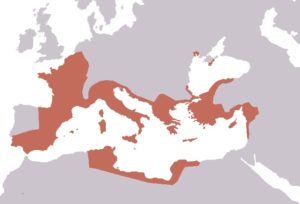
In Rome, there was trouble and the triumvirate was strained. One of the enduring strengths of this alliance was the fact that caesar’s daughter was married to Pompey, but she died while giving birth. Caesar offered him another relative, albeit a distant one this time. and that was turned down.
Things went from bad to worse when the third member of the triumvirate, Crassus, died in a military campaign. Pompey then married the daughter of one of Julius Caesar’s political enemies and that was the end of the triad.
Julius Caesar meanwhile was busy fighting insurrection in Gaul, campaigns that at times may not have gone as he wanted, but he nonetheless come out as a victor. The many tribes had known if they fought each other and the Romans they were done for, so they formed an alliance and did have some success against Caesar’s armies.
But in the end, Caesar was victorious and he marched through parts of Europe and defeated around 300 tribes while destroying 800 cities.
Civil War
Julius Caesar is now 50 years old and he faces a very big problem. Pompey is heading the senate and he’s just demanded that Caesar disband his legions and return to Rome. Caesar is seen as a power unto himself and a threat to those in the senate. He’s accused of insubordination and treason.
He knows what will happen and he does not meet the demand. Instead, he takes a single legion, men who are wholeheartedly behind him, to the border of Italy. He will not bow down. In Caesar’s own words he said, “the die is cast” and he entered Italy ready to go against his opponents in the senate. Caesar was vastly outnumbered with his one legion, but those were hardened men who’d been fighting tribes for some time.
The fight didn’t even happen and Pompey fled to Spain with his tail between his legs. Julius Caesar went in pursuit and left Rome in the hands of the great Mark Anthony. Caesar had no ships since they had been taken by Pompey, and so he marched into Spain, first subduing anyone that might align with Pompey and his troops, and then going in search of Pompey himself.
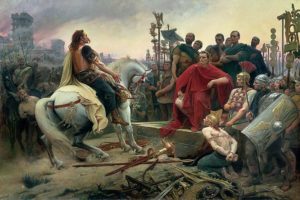
What ensued was the battle of Dyrrhachium, and at first, Pompey had all the strategic advantages. Caesar’s army was in a bad position, unable to attack and blocked in so they could not get provisions to feed themselves.
Pompey, on the other hand, had the sea, and he could wait as long as he wanted. But as time went by Pompey was finding it more difficult to get supplies, while the harvest was on its way and Julius Caesar would be in good stead for battle.
When the fighting finally commenced, Caesar lost ground he was simply outnumbered by Pompey’s forces. Both forces didn’t back down but in the end, Caesar halted his attacks. Both armies retreated and went in search of more men as well as supplies, and then what happened sometime after was the battle of Pharsalus in Greece.
Pompey again was in a much stronger position with double the troops that Julius Caesar had and a lot more provisions. He knew if he just waited, Caesar’s army would starve. But the senate demanded Pompey’s attack and so he did. Caesar’s battle-hardened soldiers were commendable, and his instructions were perfect.
At the end of the battle when many men had lost their lives all Pompey could do was watch his men running away. He had finally been defeated. Julius Caesar was a proud man and it’s said he remembered every officer, or centurion, by their name.
Pompey fled to Egypt but there Ptolemy XIII demanded that he be executed. He gave the head to Caesar to see. It backfired and Caesar was inflamed because he had been using his time granting amnesty to all those in the Senate that had been against him.
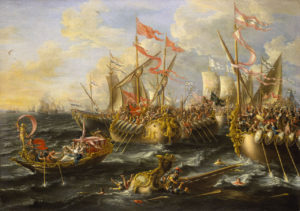
Instead of killing his enemies and anyone who had fought against him, Julius Caesar showed mercy and allowed the men to live their lives normally. Caesar then campaigned against the Egyptian pharaoh and he won again. He made the great Cleopatra the ruler and they become lovers, which is a story that has gone down in history. Although Julius Caesar was married in Rome, what happened in Egypt kind of stayed in Egypt.
Now dictator of Rome, Caesar went off again on more campaigns and this time he easily defeated armies in the Middle East. He moved on to Africa where there were Roman enemies who had been aligned with Pompey, and while he didn’t win all the fights, he did enough.
The campaigns didn’t stop and Caesar went away to Spain. At this time his name was being sung in the streets and he was being praised for the great and merciful man he was. His enemies were not all slaughtered. but they had not turned against him in Rome. But enmity towards him started to fester when he was made dictator for another ten years.
Dictatorship
Julius Caesar returned to Rome and began a course of social reforms that supported the lower and middle classes. This infuriated most of the wealthy people of course. He wanted to reform tax subsidize grain, reduce government debt, support veterans of the military, and give Roman citizenship to people in territories far and wide.
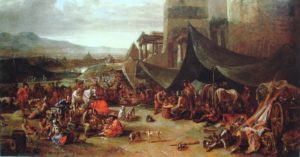
He made laws so that certain people couldn’t buy extravagant luxury goods. He also brought in the Julian calendar, the per-cursor to the calendar we use today in the west. At the same time, he held outrageous games where 100s of wild animals were killed as well as over 2,000 war captives. This kind of thing was seen as over the top by some people.
Julius Caesar Death
It was March 15 and Caesar was 55 years old. He had won many of the people and had become known as a mighty leader, but his power and his reforms had annoyed many of the Roman elites. They wanted him dead, and so they plotted to assassinate him. Mark Anthony had got wind of this plot, but his own plan to inform Caesar was thwarted.
Julius Caesar was called to the senate where he thought he had some matters to deal with, but little did he know that when he arrived those waiting for him had all conspired to kill him. Senators grabbed him and pulled him to the ground and then proceeded to stab him. His body Stabbed 23 times and 60 men were involved.
It was the politician Marcus Junius Brutus that led the plot, and some records state that Caesar’s last words were, “you too, Brutus?” Brutus then marched through the streets announcing to the people that once again Rome was free.
The consequence of this was the lower and middle classes were outraged that their champion had been brutally murdered by corrupt politicians. They became a mob and a violent one at that. The story is a long one, but civil wars ensued.
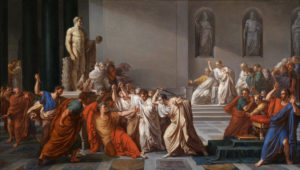
Mark Anthony aligned with Caesar’s old flame, Cleopatra, and the two of them warred against Caesar’s grandnephew, Octavian. Octavian won, and he becomes the first emperor of the Roman Empire.
Julius Caesar has gone down as perhaps the greatest military leader in ancient Rome, and he had an expression he used to state how he quickly dealt with other armies. That was, “Veni, Vidi, Vici” or “I come, I saw, I conquered.”
Very knowledgeable article
[…] following year at his ancestral home in Laurium, ending what was then the second-longest reign of the Roman Empire after that of Augustus. A few days later, he was deified at the request of his […]
Very neat blog article.Thanks Again.